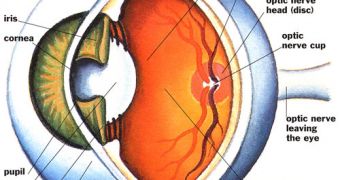French researchers have identified a new cell receptor that they think acts like a switch in causing multiple small blood vessels to expand and spiral out of control. This is the major cause for blindness throughout the world, especially in retinopathy cases, when severely inflated veins can cause the retina to separate itself from the rest of the eye and, as a result, the patient loses vision completely.
By inhibiting the effects of the GPR91 receptor, scientists at Sainte-Justine Hospital Research Center, the Université de Montréal and the Institut National de la Santé et de la Recherche Médicale (INSERM) in France, hope to regulate the growth of blood vessels inside patients’ eyes, which can prevent or even treat blindness. Currently, almost 90 percent of all diabetes sufferers in the world develop diabetic retinopathy, which causes them to eventually lose their sight.
Dr. Mike Przemyslaw Sapieha, at the Sainte-Justine Hospital Research Center and the Université de Montréal, expresses his optimism that doctors will be able to isolate the troublesome receptor and to create a viable means of inhibiting it as part of the treatment. "Inhibition of GPR91 has a great therapeutic potential to halt these blinding diseases." Sapieha said.
Other than helping cure eye issues, the receptor could also be used to regenerate damaged brain cells and to stop cancer growth. The team behind the study says that the receptors in the retina are very similar to neurons that make up the human brain and that they envision numerous medical applications for their latest finding, including salvaging or repairing neurons that were affected in strokes or severe head injuries.
Furthermore, the GPR91 could be used to combat cancer tumor growth, by virtually stopping all blood flow to the affected area of the lung, breast, colon or cervix. Although all these assumptions currently remain at a theoretical level, Dr. Sapieha says that in three or four years their research will move on to human clinical testing; this means that it could take some time before the average mortal experiences its effects. "We expect these findings to have an enormous impact." the researcher concluded.

 14 DAY TRIAL //
14 DAY TRIAL //